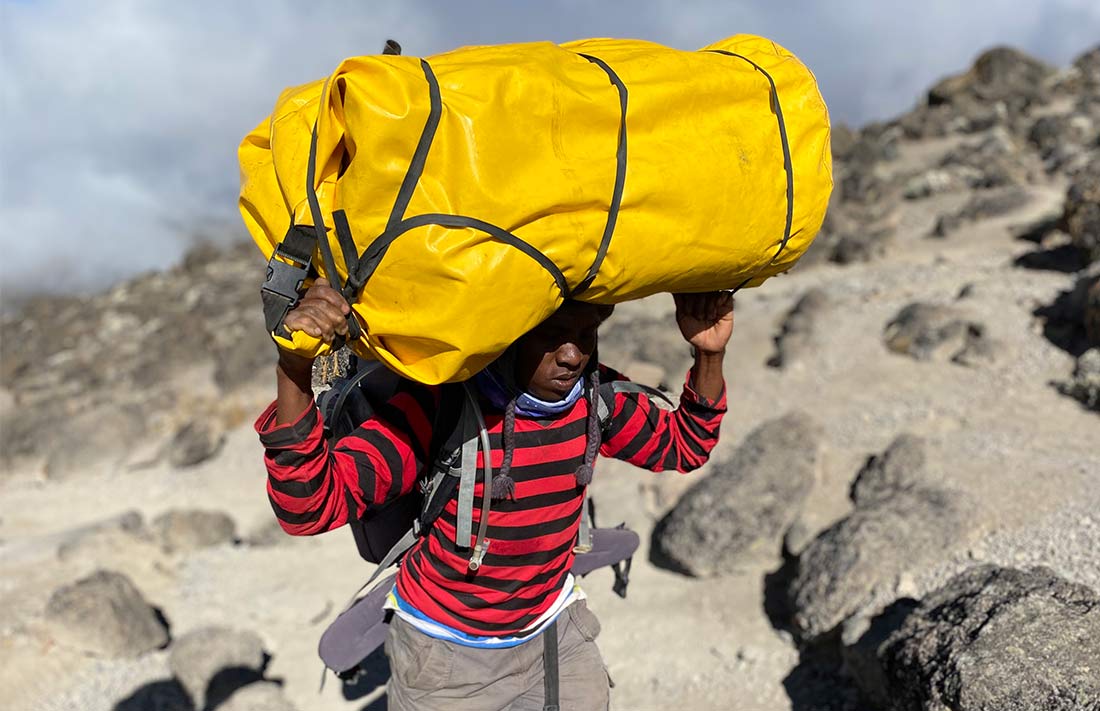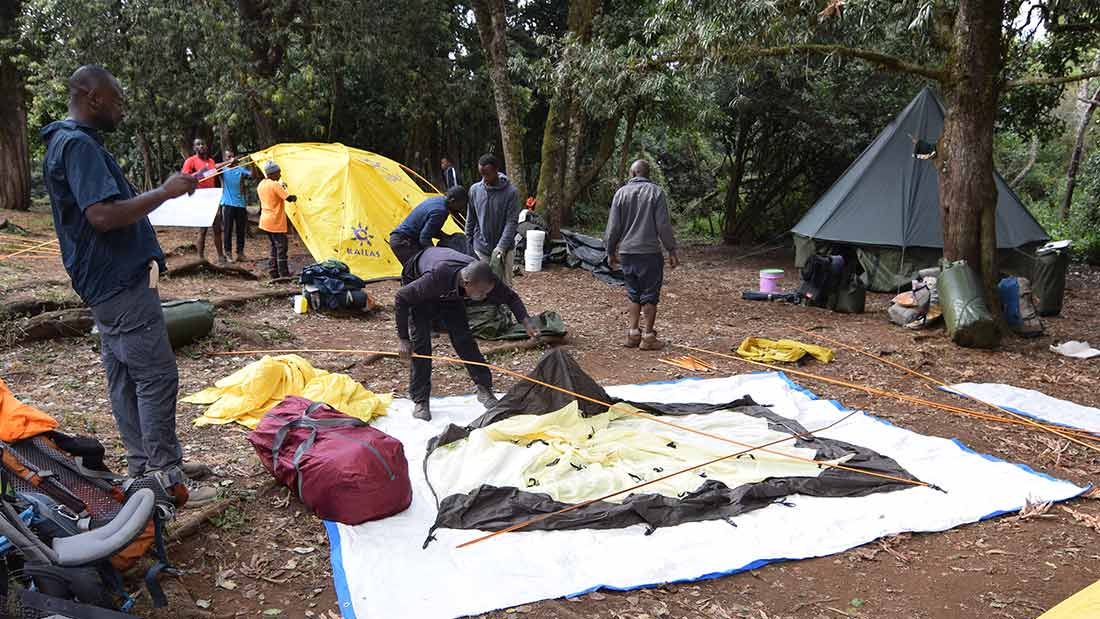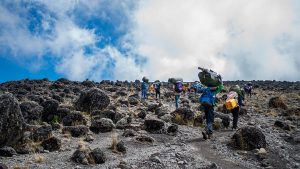Tipping in the US is a subject that has come under a lot of scrutiny since COVID-19. Many employers do not give a living wage to their employees and expect the customer to make up the difference. Not only are we feeling tipping fatigue, but may go as far as avoiding establishments that make you feel uncomfortable when it comes to tipping.
As someone who has experienced climbing Kilimanjaro with another company, I did feel obligated to give more tips than were required. Our group was even made to feel bad about the amount we gave.
Additionally, I recently returned from canyoning in Costa Rica where I was pressured into giving more tips. This was not only for the canyon guide but throughout the country.
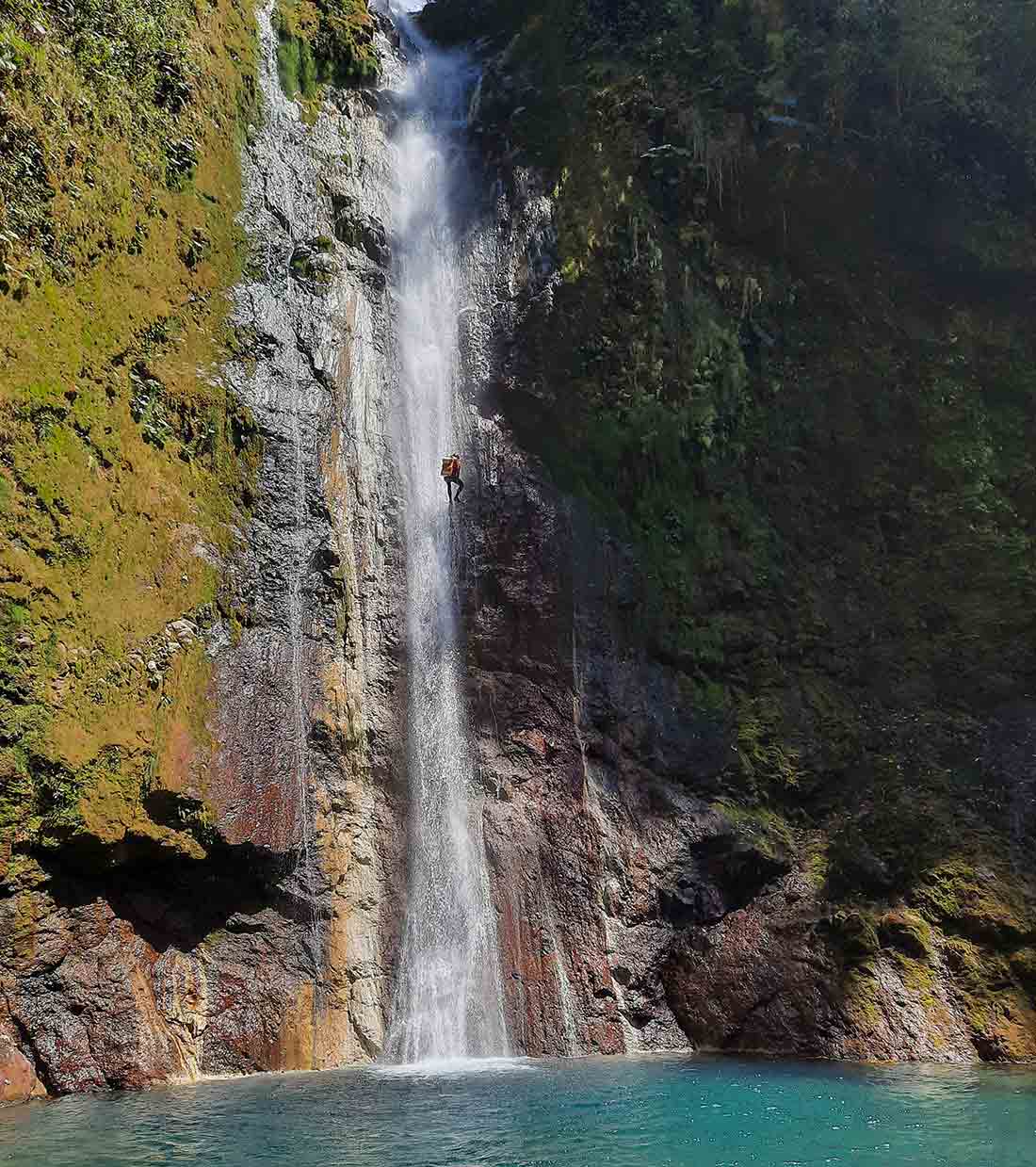
Previous clients have also expressed confusion about how the tipping process works. We do give detailed instructions at the initial trip briefing. But this article will help you prepare before you go to Tanzania.
The Importance of Tipping
Tipping is an integral part of climbing Kilimanjaro, not just because it’s a customary practice but also because it directly impacts the livelihoods of the porters who assist climbers on their journey. Porters play a vital role in making the climb possible by carrying equipment, setting up camps, and providing essential support to climbers. Their hard work and dedication often go unnoticed, making tipping a way to express gratitude and support their livelihoods.
Understanding the Tipping Process
Tipping on Kilimanjaro typically involves a structured system based on the number of days spent on the mountain and the size of the climbing group. While there are no strict rules regarding tipping amounts, there are generally accepted guidelines that climbers adhere to. These guidelines are designed to ensure fair compensation for the entire crew, including guides, cooks, and porters.
Keep in mind, that you should not feel pressured to give additional tips. Give what you feel is right. Many clients have felt that the amount they give is not enough. They watched the porters work hard every day and want to give more. Furthermore, the US dollar goes a long way in Tanzania.
You can see the exchange rate here: https://wise.com/us/currency-converter/usd-to-tzs-rate
Tipping Ceremony
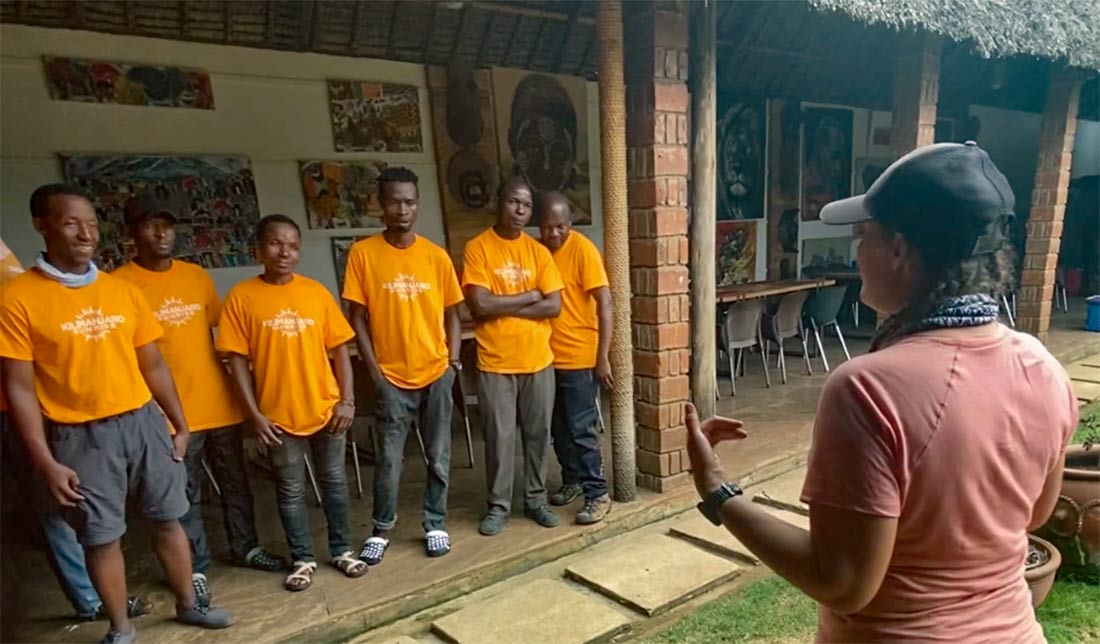
At the end of your climb, we will have a tipping ceremony. One person from your group will address the guides and porters and tell the amounts that each person will receive for their hard work.
It is important to note that many cultures do not tip. Typically Americans do tip and may feel obligated to “fill in” the tips that were not given by people from nontipping cultures.
We recommend bringing between $700-800 to be sure you have enough money for tips. If you are a single climber on a private climb, then looking at the table below you’ll see that you’ll need to increase that amount. The bills should be 2009 and newer, undamaged bills. $100 bills are great for tipping since the exchange rate is better with the larger bills.
The Role of KPAP
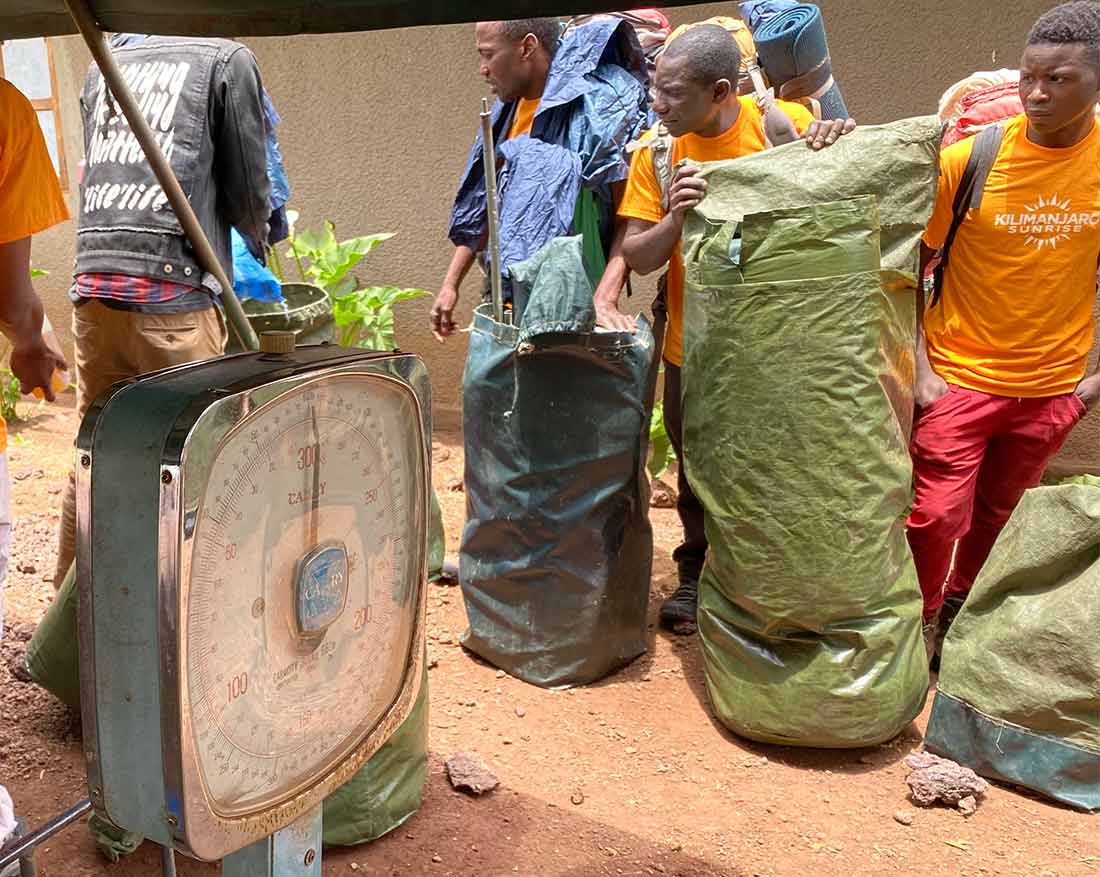
The Kilimanjaro Porters Assistance Project (KPAP) is a nonprofit organization dedicated to improving the working conditions of porters on Kilimanjaro and advocating for fair treatment and compensation. One of the key initiatives of KPAP is to establish tipping standards that reflect the actual needs of the porters and ensure they receive a fair share of the tips collected by climbing companies.
Setting Tipping Amounts
So how much do you tip? KPAP has developed a tipping guideline that recommends minimum tipping amounts based on the length of the climb and the number of climbers in the group.
- Guide / Assistant Guide: $25 per day/group
- Cook: $15 per day/group
- Summit Porter $15 per day/group
- Porter: $10 per day/group
Still confused? View the table below for more information. We have done the math for the number of mountain crew, number of days, and number of people in your group.
| Group Size | 6 Days | 7 Days | 8 Days | 9 Days |
| 1 | 570 | 665 | 760 | 855 |
| 2 | 495 | 578 | 660 | 743 |
| 3 | 390 | 455 | 520 | 585 |
| 4 | 338 | 394 | 450 | 506 |
| 5 | 354 | 413 | 472 | 531 |
| 6+ | 325 | 379 | 433 | 488 |
Mountain Crews
The number of guides, cooks, and porters varies depending on the number of people in your group, whether or not you rented private toilets, and if you bring too much gear and the Park dictates that you need additional porters.
Here are the number of crew we bring based on the number of trekkers, the number of days, and the route:
6 Day Rongai |
|||
| Trekkers | Guides | Cooks | Porters |
| 1 | 1 | 1 | 5 |
| 2 | 2 | 1 | 8 |
| 3 | 2 | 1 | 13 |
| 4 | 2 | 1 | 14 |
| 5 | 3 | 1 | 18 |
| 6 | 3 | 1 | 21 |
| 7 | 3 | 1 | 24 |
| 8 | 4 | 1 | 27 |
| 9 | 4 | 1 | 30 |
| 10 | 4 | 1 | 32 |
7 Day Machame |
|||
| Trekkers | Guides | Cooks | Porters |
| 1 | 1 | 1 | 5 |
| 2 | 2 | 1 | 7 |
| 3 | 2 | 1 | 13 |
| 4 | 2 | 1 | 15 |
| 5 | 3 | 1 | 17 |
| 6 | 3 | 1 | 20 |
| 7 | 3 | 1 | 23 |
| 8 | 4 | 1 | 26 |
| 9 | 4 | 1 | 29 |
| 10 | 4 | 1 | 32 |
8 Day Lemosho |
|||
| Trekkers | Guides | Cooks | Porters |
| 1 | 1 | 1 | 5 |
| 2 | 2 | 1 | 9 |
| 3 | 2 | 1 | 14 |
| 4 | 2 | 1 | 17 |
| 5 | 3 | 1 | 19 |
| 6 | 3 | 1 | 22 |
| 7 | 3 | 1 | 25 |
| 8 | 4 | 1 | 28 |
| 9 | 4 | 1 | 31 |
| 10 | 4 | 1 | 34 |
6 Day Marangu |
|||
| Trekkers | Guides | Cooks | Porters |
| 1 | 1 | 1 | 2 |
| 2 | 2 | 1 | 4 |
| 3 | 2 | 1 | 6 |
| 4 | 2 | 1 | 8 |
| 5 | 3 | 1 | 10 |
| 6 | 3 | 1 | 12 |
| 7 | 3 | 1 | 14 |
| 8 | 4 | 1 | 16 |
| 9 | 4 | 1 | 18 |
| 10 | 4 | 1 | 20 |
The Marangu route does not require as many porters since you sleep in huts versus tents.
Adhering to KPAP’s Policy
As responsible climbers, it’s essential to adhere to KPAP’s tipping policy. This ensures that porters receive fair compensation for their work. When booking a climb with a tour operator, it’s important to inquire whether they are KPAP partners and whether they adhere to KPAP’s tipping guidelines. Climbers should also be transparent about tipping and ensure that the recommended amounts are distributed equitably among the crew.
The Impact of Fair Tipping
Fair tipping not only benefits the porters directly involved in the climb but also contributes to the overall welfare of their families and communities. By supporting initiatives like KPAP and adhering to their tipping guidelines, climbers can help improve the working conditions and livelihoods of porters on Kilimanjaro. Additionally, fair tipping fosters a culture of respect and appreciation for the invaluable contributions of local communities to the tourism industry.
Final Thoughts
Tipping on Kilimanjaro is not just a customary practice but a means of supporting the hardworking porters who make the climb possible. Organizations like KPAP play a crucial role in setting tipping standards and advocating for fair compensation for porters. By adhering to KPAP’s policy and tipping guidelines, climbers can ensure that their gratitude translates into tangible support for the local communities that enrich their climbing experience. As you embark on your Kilimanjaro journey, remember that every tip makes a difference in the lives of those who accompany you on this unforgettable adventure.

